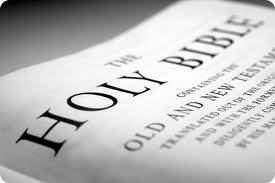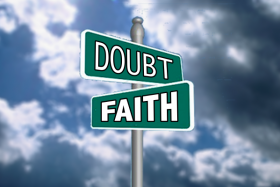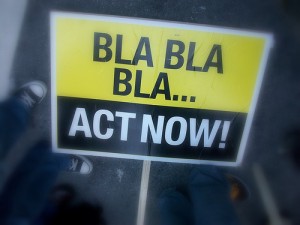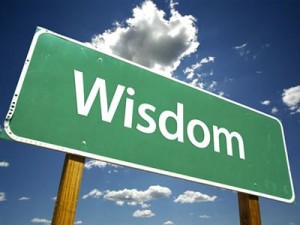From the Gospel of John:
Jesus said: “You search the scriptures because you think that in them you have eternal life; and it is they that testify on my behalf. Yet you refuse to come to me to have life. I do not accept glory from human beings. But I know that you do not have the love of God in you. I have come in my Father’s name, and you do not accept me; if another comes in his own name, you will accept him. How can you believe when you accept glory from one another and do not seek the glory that comes from the one who alone is God? Do not think that I will accuse you before the Father; your accuser is Moses, on whom you have set your hope. If you believed Moses, you would believe me, for he wrote about me. But if you do not believe what he wrote, how will you believe what I say?”
(From the Daily Office Lectionary – John 5:39-47 (NRSV) – March 1, 2013.)
 It’s called bibliolatry and it’s been around a long, long time. The dictionary definition of bibliolatry is “excessive reverence for the Bible as literally interpreted.” What I most enjoy about modern bibliolatry is that it denies that it is bibliolatry in the most circular and bibliolatrous of ways.
It’s called bibliolatry and it’s been around a long, long time. The dictionary definition of bibliolatry is “excessive reverence for the Bible as literally interpreted.” What I most enjoy about modern bibliolatry is that it denies that it is bibliolatry in the most circular and bibliolatrous of ways.
For instance, this is from a website that claims its stance on Holy Scripture is not bibliolatry because of what Scripture says about itself:
It is important to understand what the Bible says about itself. Second Timothy 3:16-17 declares, “All Scripture is God-breathed and is useful for teaching, rebuking, correcting and training in righteousness, so that the man of God may be thoroughly equipped for every good work.” So, if the Bible is “God-breathed,” and “God does not lie” (Titus 1:2), then every word in the Bible must be true. Believing in an inerrant, infallible, and authoritative Bible is not bibliolatry. Rather, it is simply believing what the Bible says about itself. Further, believing what the Bible says about itself is in fact worshipping the God who breathed out His Word. Only a perfect, infallible, omnipotent, omnipresent, and omniscient God could create written revelation that is itself perfect and infallible.
In so many words what this says is, “The Bible is inerrant and infallible because it says it is.” It doesn’t actually (that is not a valid interpretation of Second Timothy or Titus), but is anything else (other than, perhaps, the holy books of other religions) given that kind of reverence? Is any other source of information permitted that sort of self-validation without question?
The Jews of Jesus’ day did not (and to this day do not) view Scripture as inerrant, but those to whom Jesus was speaking did rely on the Torah quite heavily; they gave it, perhaps, excessive reverence. The Pharisees did search the scriptures for rules of behavior and piety because they thought that in them they would find eternal life. In this regard, I believe, the evangelical literalists resemble them with their approach to the Bible as inerrant and infallible.
At a meeting of the Evangelical Theological Society, Professor J.P. Moreland of Biola University said:
In the actual practices of the Evangelical community in North America, there is an over-commitment to Scripture in a way that is false, irrational, and harmful to the cause of Christ. And it has produced a mean-spiritedness among the over-committed that is a grotesque and often ignorant distortion of discipleship unto the Lord Jesus.
It’s that mean spiritedness that concerns me. It has spread throughout the Christian community, not simply among Evangelicals. It seems to me that we are all, to one extent or another, bibliolatrists. We may not consider the Bible inerrant and infallible, but we have our favorite bits of Scripture that we emphasize and hold in “excessive reverence” . . . and when our particular position on some issue is challenged, we can all be mean-spirited and often are. When that happens, the Scriptures are our accuser. Just as Jesus said to the Jews about the Torah, so we should think of the New Testament:
“This is my commandment, that you love one another as I have loved you.” (John 15:12 NRSV)
“Be of the same mind, having the same love, being in full accord and of one mind.” (Philippians 2:2 NRSV)
“You do well if you really fulfill the royal law according to the scripture, ‘You shall love your neighbor as yourself.'” (James 2:8 NRSV)
“Finally, all of you, have unity of spirit, sympathy, love for one another, a tender heart, and a humble mind.” (1 Peter 3:8 NRSV)
“Little children, let us love, not in word or speech, but in truth and action.” (1 John 3:18 NRSV)
“May mercy, peace, and love be yours in abundance.” (Jude 1:2 NRSV)
In our several liberal denominations, we may not take the Bible literally; we may not consider it completely authoritative in all spheres of life. I, for one, do not. The Bible is not a scientific text; it is not a history book. When poetry in the Bible says that mountains skipped like rams or hills like lambs (Ps. 114), I do not take that as a literal fact. When the creation stories of Genesis say that God created everything in six days or made humans out of mud, I do not take that as scientific fact. When the Bible says the sun stood still and the moon stopped for a day, I don’t take that to be a historical reality. (Joshua 10:13) I take these tales seriously. I believe that they reveal truth, but I do not believe they are factual. In the same way, I take John, Paul, James, Peter, and Jude seriously.
If we give into mean spiritedness, it is they who will accuse us. And we will be convicted.
====================
A request to my readers: I’m trying to build the readership of this blog and I’d very much appreciate your help in doing so. If you find something here that is of value, please share it with others. If you are on Facebook, “like” the posts on your page so others can see them. If you are following me on Twitter, please “retweet” the notices of these meditations. If you have a blog of your own, please include mine in your links (a favor I will gladly reciprocate). Many thanks!
====================
Father Funston is the rector of St. Paul’s Episcopal Church, Medina, Ohio.
 It may be the United States’ holiday of Thanksgiving Day, but the Daily Office continues at this time of year delivering its message of repentance rather than encouraging thanksgiving. The Old Testament lesson is another from Malachi in which the Lord speaking to the priests says that he has spread dung on their faces and put them out of his presence! The gospel lesson from Luke has Jesus predicting the end of the world. And then there’s this epistle lesson which condemns the wealthy. Just not a lot of giving thanks!
It may be the United States’ holiday of Thanksgiving Day, but the Daily Office continues at this time of year delivering its message of repentance rather than encouraging thanksgiving. The Old Testament lesson is another from Malachi in which the Lord speaking to the priests says that he has spread dung on their faces and put them out of his presence! The gospel lesson from Luke has Jesus predicting the end of the world. And then there’s this epistle lesson which condemns the wealthy. Just not a lot of giving thanks! I suppose I take issue with Scripture more often than I should, but this is one of those bits that I just can’t agree with. I vehemently disagree with James’s equation of “doubt” with what he calls “double-mindedness”. The Greek word translated “double-minded” is dipsuchos , from dis , meaning “twice,” and psuche , meaning “mind.” James use of it to describe someone who has doubts suggests that such a person is divided in his or her interests or loyalties, wavering, two-faced, and half-hearted.
I suppose I take issue with Scripture more often than I should, but this is one of those bits that I just can’t agree with. I vehemently disagree with James’s equation of “doubt” with what he calls “double-mindedness”. The Greek word translated “double-minded” is dipsuchos , from dis , meaning “twice,” and psuche , meaning “mind.” James use of it to describe someone who has doubts suggests that such a person is divided in his or her interests or loyalties, wavering, two-faced, and half-hearted.  This is from one of today’s psalms for Evening Prayer. What got my attention and caught my imagination is the Psalmist image of unspoken thoughts being painful and bursting into flame demanding to be spoken. While it is intended to be a positive image of trying to not engage with the wicked until one can no longer refrain from doing so, until one’s righteousness is kindled against them, I could not help but be reminded of James’s words:
This is from one of today’s psalms for Evening Prayer. What got my attention and caught my imagination is the Psalmist image of unspoken thoughts being painful and bursting into flame demanding to be spoken. While it is intended to be a positive image of trying to not engage with the wicked until one can no longer refrain from doing so, until one’s righteousness is kindled against them, I could not help but be reminded of James’s words: It is said that Martin Luther hated the Letter of James; he called it an “epistle of straw” and didn’t believe it should be in the Bible. Why? Some folks will tell you it is because this epistle doesn’t support Luther’s theology of justification by grace through faith; James insists that works are necessary and the reformer just didn’t like that. However, that’s not really the case. Luther had doubts about the epistle’s apostolicity; he didn’t think it was really written by James the Apostle. He was probably right.
It is said that Martin Luther hated the Letter of James; he called it an “epistle of straw” and didn’t believe it should be in the Bible. Why? Some folks will tell you it is because this epistle doesn’t support Luther’s theology of justification by grace through faith; James insists that works are necessary and the reformer just didn’t like that. However, that’s not really the case. Luther had doubts about the epistle’s apostolicity; he didn’t think it was really written by James the Apostle. He was probably right. The collect for today from The Book of Common Prayer:
The collect for today from The Book of Common Prayer: If you are a political junkie like me, you’ve been following the campaigns, watching the conventions, reading the editorials, and generally getting angry with one side or the other or both and the whole process. You may have noticed, as I have, that candidates are never alone. They are surrounded by a whole corps, an entire gaggle of handlers, some of whom have the responsibility to make sure the candidate stays “on message”, that he or she makes no “gaffs”. Jesus was surrounded by a gaggle, as well, but these were not handlers and there was no one to keep him “on message” except himself. In fact, the gospel witness is pretty clear that even right up to the end the gaggle that followed him around really didn’t understand the message!
If you are a political junkie like me, you’ve been following the campaigns, watching the conventions, reading the editorials, and generally getting angry with one side or the other or both and the whole process. You may have noticed, as I have, that candidates are never alone. They are surrounded by a whole corps, an entire gaggle of handlers, some of whom have the responsibility to make sure the candidate stays “on message”, that he or she makes no “gaffs”. Jesus was surrounded by a gaggle, as well, but these were not handlers and there was no one to keep him “on message” except himself. In fact, the gospel witness is pretty clear that even right up to the end the gaggle that followed him around really didn’t understand the message! I want you for just a minute to close your eyes. Just sit back and relax, and imagine that you are hearing not my voice, but the voice of your beloved, the voice of the one person in this world who loves you more than any other . . . .
I want you for just a minute to close your eyes. Just sit back and relax, and imagine that you are hearing not my voice, but the voice of your beloved, the voice of the one person in this world who loves you more than any other . . . .  The Pharisees are crawling out of the woodwork! After the vote yesterday by the Episcopal Church’s 77th General Convention to give bishop’s authority to permit a “provisional rite” for the blessing of committed same-sex relationships (it’s not a marriage rite – keep saying that!) the Twitterverse has erupted with some nasty stuff from detractors and supporters alike. We humans are always so much more likely to see and criticize what we consider the sinful foibles of others than we are those of ourselves. This is what Jesus addresses here. ~ The image of a “whited sepulchre” is so evocative. In an earlier verse, Jesus has accused the Pharisees of only washing the outside of their drinking cups. And elsewhere he reminded his disciples of the unclean mess inside every human being: “Whatever goes into the mouth enters the stomach, and goes out into the sewer . . . Out of the heart come evil intentions, murder, adultery, fornication, theft, false witness, slander. These are what defile a person, but to eat with unwashed hands does not defile.” (Matt. 15:17,19-20) The tweets coming from General Convention (and from those of us observing from afar) on all sides of the many issues facing the church are certainly demonstrating the truth of this! The insides of many “whited sepulchres” are being exposed to public view. ~ I’ve been thinking about the Letter of James and how it might have been written differently if today’s communication technology had been around back in First Century Palestine . . . . Perhaps we might there have read something like this:
The Pharisees are crawling out of the woodwork! After the vote yesterday by the Episcopal Church’s 77th General Convention to give bishop’s authority to permit a “provisional rite” for the blessing of committed same-sex relationships (it’s not a marriage rite – keep saying that!) the Twitterverse has erupted with some nasty stuff from detractors and supporters alike. We humans are always so much more likely to see and criticize what we consider the sinful foibles of others than we are those of ourselves. This is what Jesus addresses here. ~ The image of a “whited sepulchre” is so evocative. In an earlier verse, Jesus has accused the Pharisees of only washing the outside of their drinking cups. And elsewhere he reminded his disciples of the unclean mess inside every human being: “Whatever goes into the mouth enters the stomach, and goes out into the sewer . . . Out of the heart come evil intentions, murder, adultery, fornication, theft, false witness, slander. These are what defile a person, but to eat with unwashed hands does not defile.” (Matt. 15:17,19-20) The tweets coming from General Convention (and from those of us observing from afar) on all sides of the many issues facing the church are certainly demonstrating the truth of this! The insides of many “whited sepulchres” are being exposed to public view. ~ I’ve been thinking about the Letter of James and how it might have been written differently if today’s communication technology had been around back in First Century Palestine . . . . Perhaps we might there have read something like this: Everywhere I look these days, no matter the time of year, the world world screams at me to “keep up”, to buy this or that, to go on vacation here or there, to take this cruise or that tour, to drive this luxury car or that SUV. I am told that if I don’t spend hundreds or even thousands of dollars on gifts, if I don’t “go to Jared” or if every kiss doesn’t “begin with Kay” I must not love my spouse. Everywhere one looks, advertisements promote excess. ~ Proverbs tells me there is a better way though. “Better is little with the fear of the Lord . . . Better is a dinner of vegetables where love is.” All the treasures of the world can never take the place of being in right relation to God. We all know people who are careening through life looking for great treasure, trying to fulfill the advertisers vision of the perfect consumer life, trying to keep up with culture, trying to respond to the media. How many of those people are truly happy? ~ We all may know (or know of) others who simply cannot do that, who are deprived by environment or circumstance of the simplest necessities, for whom the luxurious excesses promoted by our advertising are unimaginable. When the Lord simply says, “Better is little than all of that . . . .” it is a statement not merely of moderation, but of justice. Clearly, it is healthier to eat more vegetables than meat, but the import of these proverbs goes beyond personal well being. When we eschew excess, we leave more available to others, we become able to provide for the needs of those deprived of necessaries, and that allows us to move closer to God. If we do not do so, what does that say about us? ~ Remember the words of St. John: “Those who say, ‘I love God,’ and hate their brothers or sisters, are liars; for those who do not love a brother or sister whom they have seen, cannot love God whom they have not seen.” (1 John 4:20) Remember also the words of St. James: “If a brother or sister is naked and lacks daily food, and one of you says to them, ‘Go in peace; keep warm and eat your fill,’ and yet you do not supply their bodily needs, what is the good of that?” (James 2:15-16) “Better is a dinner with vegetables . . . . “
Everywhere I look these days, no matter the time of year, the world world screams at me to “keep up”, to buy this or that, to go on vacation here or there, to take this cruise or that tour, to drive this luxury car or that SUV. I am told that if I don’t spend hundreds or even thousands of dollars on gifts, if I don’t “go to Jared” or if every kiss doesn’t “begin with Kay” I must not love my spouse. Everywhere one looks, advertisements promote excess. ~ Proverbs tells me there is a better way though. “Better is little with the fear of the Lord . . . Better is a dinner of vegetables where love is.” All the treasures of the world can never take the place of being in right relation to God. We all know people who are careening through life looking for great treasure, trying to fulfill the advertisers vision of the perfect consumer life, trying to keep up with culture, trying to respond to the media. How many of those people are truly happy? ~ We all may know (or know of) others who simply cannot do that, who are deprived by environment or circumstance of the simplest necessities, for whom the luxurious excesses promoted by our advertising are unimaginable. When the Lord simply says, “Better is little than all of that . . . .” it is a statement not merely of moderation, but of justice. Clearly, it is healthier to eat more vegetables than meat, but the import of these proverbs goes beyond personal well being. When we eschew excess, we leave more available to others, we become able to provide for the needs of those deprived of necessaries, and that allows us to move closer to God. If we do not do so, what does that say about us? ~ Remember the words of St. John: “Those who say, ‘I love God,’ and hate their brothers or sisters, are liars; for those who do not love a brother or sister whom they have seen, cannot love God whom they have not seen.” (1 John 4:20) Remember also the words of St. James: “If a brother or sister is naked and lacks daily food, and one of you says to them, ‘Go in peace; keep warm and eat your fill,’ and yet you do not supply their bodily needs, what is the good of that?” (James 2:15-16) “Better is a dinner with vegetables . . . . “

